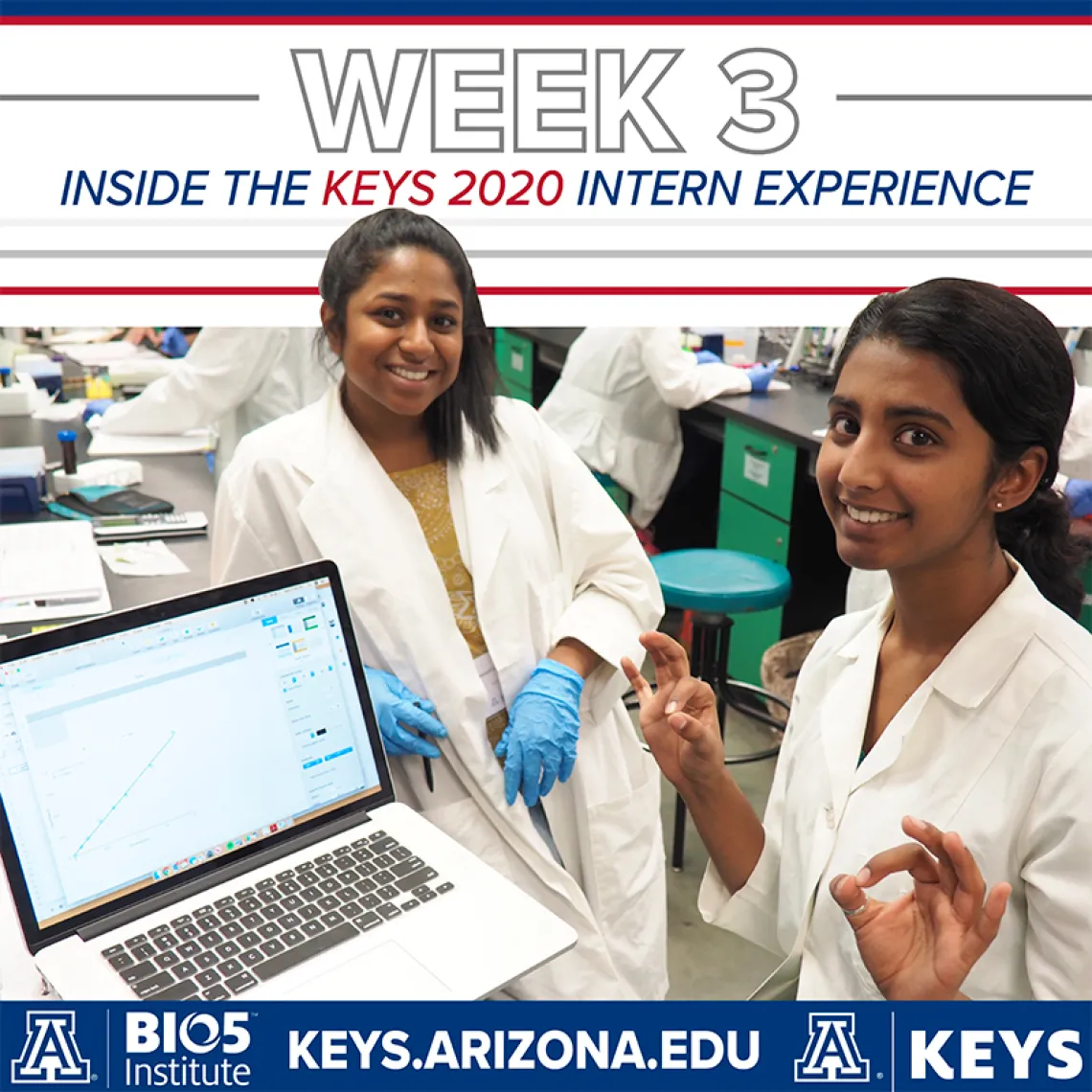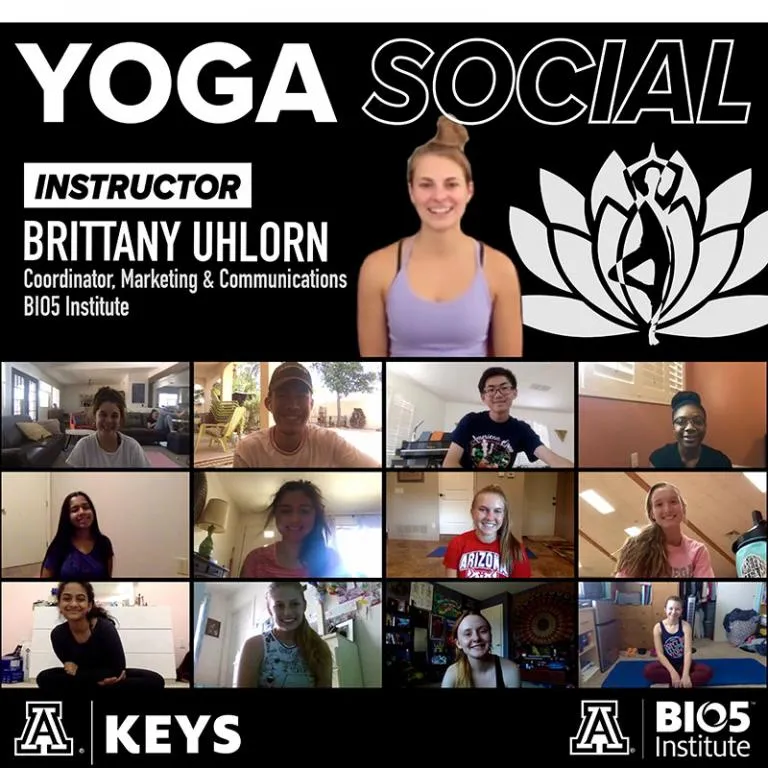KEYS Check-In – Week 3
Follow along with four KEYS interns during their third week participating in a data science research internship from home.

Having completed three of the seven weeks of their summer internship, students participating in BIO5’s Keep Engaging Youth in Science (KEYS) Research Internship Program are now fully immersed in their research. Interns have been busy learning programming languages and analyzing big data to address some of the most challenging research questions in STEM.
On June 25, the students listened to a seminar by Dr. Anita Koshy, associate professor in the departments of neurology and immunobiology. A medical doctor by training, Dr. Koshy discussed her journey to become a physician-scientist. She also gave the interns a glimpse at her research on Toxoplasma gondii, a parasite that infects and persists within the central nervous system of many warm-blooded hosts, including birds and humans.
After a long week spent hunching over their computers, Dr. Brittany Uhlorn, BIO5 Coordinator of Marketing and Communications and UArizona alumna, spearheaded a KEYS yoga social on Saturday, June 27. She led the students in an hour-long yoga class to get them moving and reenergized. Dr. Uhlorn taught the interns that the practice of yoga is not only a nourishing way to take care of their physical health, but a tool that can also support their mental health.
---
Christina Niyigena, an intern in the lab of Dr. Michael Marty, assistant professor in the Department of Chemistry and Biochemistry, has been busy working with her data in Python, a programming language. She’s been writing code that isolates a single variable of a large data set, making it easier to work with than sorting the data by hand. Now having spent two weeks in her lab, Christina says she is starting to feel more comfortable with coding.
“This week has been better than last week because I’ve actually accomplished something,” she said.
Dr. Marty has now tasked Christina with creating a function using NumPy, a mathematical package within Python. The NumPy library has a large collection of advanced mathematical and statistical actions that can be used to perform analyzes on the data she imports into the software. If her function is successful, Christina said Dr. Marty is going to incorporate it into his larger project.
“It’s a small contribution, but I’m happy knowing I’m going to help,” she said.
At times she struggles with navigating the different programming languages and software necessary to complete her project, but Dr. Marty and his graduate student, Marius Kostelic, have been easily approachable and supportive. Though it’s uncomfortable to admit she needs help, Christina has been grateful that she has mentors who are there to answer her questions, big and small.
Dr. Koshy’s seminar was exceptionally impactful for Christina. Desiring to pursue a career in neuroscience, Christina was inspired by Dr. Koshy’s journey as a physician-scientist. The way Dr. Koshy effectively communicated her complex research project left a monumental impression on Christina.
“I was just like, ‘Wow, I want to be like you when I grow up,’” Christina recalls thinking about Dr. Koshy during her seminar.
After working on a “microproject” last week with Dr. Leif Abrell, associate research scientist in the Department of Environmental Science, Sonia Mathur dove into her main assignment this week. She’s using the RStudio software to construct mixed-model graphs that will describe the association between water contaminants and their possible sources.
“I’m really excited because I’m getting into the nitty gritty of what the lab does,” she said.
While immersing herself in this new project was the highlight the week for Sonia, wrestling with the computer program has also been a low point. But with the help of her mentors, her fellow KEYS interns and her sister, she’s optimistic she’ll find a rhythm soon enough.
“Once I learn RStudio, I can really get into the actual data analysis,” she said. “It’s the one obstacle I have to beat, because after that, I’m smooth sailing.”
Sonia has also continued to enjoy the social aspect of KEYS. While it’s been difficult to talk with each of the other 48 interns during their large group meetings, she is able to bond with a smaller group of her peers and their KEYS Crew mentor during their small breakout meetings. In these sessions, Sonia can share challenges with her research with the others, who in turn provide resources and links to online tutorials.
Esha Mathur has been hard at work studying moss genomes with Dr. Bonnie Hurwitz, assistant professor of agricultural and biosystems engineering. She’s searching for viral sequences among the moss genetic material using BLAST, a bioinformatics tool to compare sequences of genetic material across organisms. Since little is known about viruses in terrestrial ecosystems, Esha could identify new viruses through her KEYS project.
Much of her research relies on the limited availability of the university’s high-performance computing systems. To prepare for the work ahead, Esha and her mentor hashed out a workflow that will help streamline the next four weeks of her project. Her lab also took the time to discuss the fundamentals of cross-disciplinary work and how collaboration enable new discoveries.
“We talked about how nobody really comes up with anything new, but it’s people building off of each other’s ideas,” she said. “That’s how people are progressing in whatever field they’re in.”
Though initially worried she wouldn’t be able to get the help she needed to complete her project because of its remote nature, Esha has been pleasantly surprised by how much she is interacting with her lab. She’s included in daily, virtual team meetings, and whenever she encounters a roadblock in her research – even at 1 a.m. – Esha said her mentors ensure she gets the help she needs.
“I feel honestly that I’ve gotten more help than I would have gotten if (KEYS) was in person,” she said.
This past week flew by for Esha and Sonia’s brother, Nikhil (Nik), who is working with Dr. Pascale Charest, associate professor of molecular and cellular biology. After spending his first few days in the lab reading research papers and understanding the basics of cancer cell migration, Nik was able gain traction on his project this week. He and three other KEYS interns – Natalia Bojorquez (Nogales HS), Grace Harrington (Cactus Shadows HS), and Douglas Swango (BASIS Tucson North HS) – mined two online databases of cancer-associated genes, Oncomine and cBioPortal, for genes of interest. Nik has enjoyed working with the other KEYS interns in Dr. Charest’s lab because they provide him with different viewpoints that help him grow.
“I find it as a benefit because they always have a different way of approaching something…or have outside knowledge which helps to contribute to our Zoom meetings,” he said. “It helps me learn.”
Nik’s peers aren’t the only ones providing helpful insight. Graduate students Mollie Wiegand and Alyssa Werner lead the team of interns and are available around the clock to provide them with help. The two even created a slideshow with a step-by-step tutorial to teach the interns how to mine the publicly available database for genes of interest.
“It’s a hard website to use, so it was really nice that they were willing to take the time to create this slideshow so that I could get what I need,” he said.
Nik has also enjoyed getting to know Dr. Charest. She’s changed his perspective on how a person with a Ph.D. acts and talks.
“Dr. Charest’s been great. She brings a lot of energy to the conversation,” he said. “That’s one thing I enjoy because when you think of a doctor, you don’t really think they’re going to be energetic…but she is just really exciting and brings a ton of energy to the group.”
Missed what happened during the first two weeks of the KEYS program? Get the backstory on these four interns and their projects here.
About KEYS
The KEYS program is led by the BIO5 Institute and is funded by BIO5 and generous supporters including individuals, families, companies, foundations and various UArizona faculty, colleges and departments. The Technology and Research Initiative Fund (TRIF) that helped launch BIO5 almost 20 years ago continues to be a catalyst in enabling effective, cross-disciplinary bioscience research, innovation and impact at the University of Arizona, and also enables world-class student engagement programs like KEYS.
For additional information about the KEYS Research Internship Program, email keys@bio5.org(link sends e-mail).
About the University of Arizona BIO5 Institute
The BIO5 Institute at the University of Arizona connects and mobilizes top researchers in agriculture, engineering, biomedicine, pharmacy, basic science, and computational science to find creative solutions to humanity’s most pressing health and environmental challenges. Since 2001, this interdisciplinary approach has been an international model of how to conduct collaborative research, and has resulted in disease prevention strategies, promising new therapies, innovative diagnostics and devices, and improved food crops. For more information: BIO5.org

Week three ended with a yoga social led by Dr. Brittany Uhlorn.
Ryan Hunt, BIO5 Public Affairs and KEYS Crew

